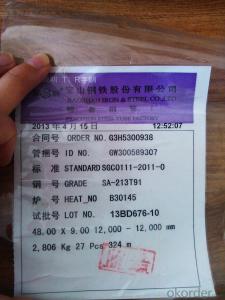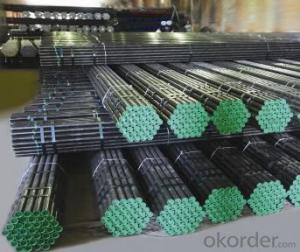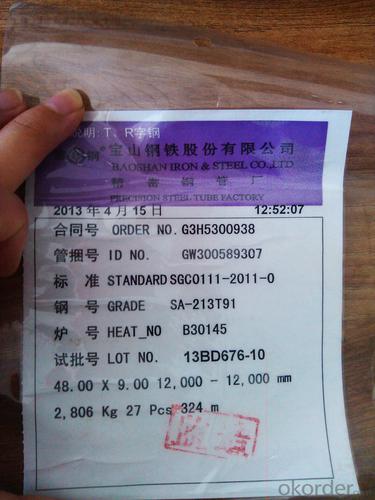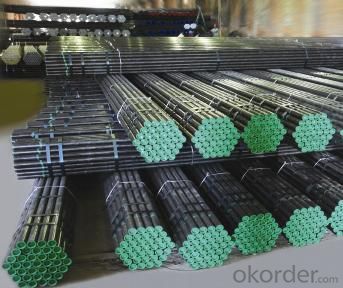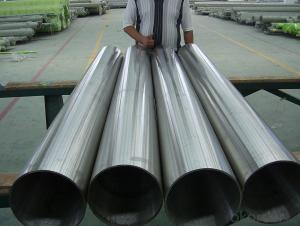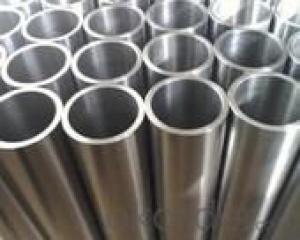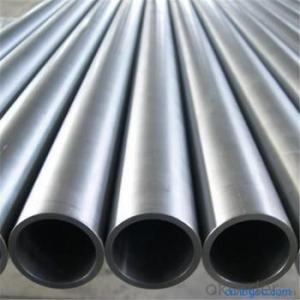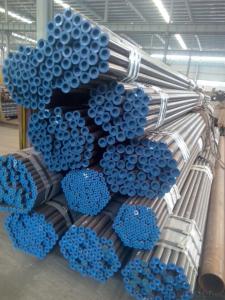ASTM A213 T91 boiler tube
- Loading Port:
- Shanghai
- Payment Terms:
- TT OR LC
- Min Order Qty:
- -
- Supply Capability:
- 30000 kg/month
OKorder Service Pledge
OKorder Financial Service
You Might Also Like
Alloy pipe stock grade A335P11/P22/P12/P91/P92/P9/P5 A213 T11/T22/T12/T91/T91/T9/T5
T91 alloy pipe is America national tree like ridge and America combustion new martensitic heat-resistant steel engineering company metallurgical materials laboratory research work. It is to reduce the carbon content of 9Cr1MoV steel on the basis of the content of sulphur, phosphorus, strictly limit the vanadium, niobium, adding small amount of alloying elements.
The number of K90901 T91 alloy tube
T91 alloy tube
T91 alloy pipe specifications: 8-1240 x 1-200mm
Overview of T91 alloy tube:
T91 alloy tubes for ferrite and Olympic alloy steel seamless steel tube boiler, overheating and heat exchanger belongs to (ASTM A213 / A213M-07a)
Use:
For low and medium pressure boiler (work pressure is generally not more than 5.88Mpa, the operating temperature at 450 DEG C) of the heating surface tube; used for high pressure boiler (work pressure is generally above 9.8Mpa, operate at a temperature of 450 DEG to 650 DEG C between) the heating surface tubes, economizer, superheater, reheater, petrochemical industrial pipe.
Heat treatment of T91 alloy tube:
The final heat of T91 treatment for normalizing and high temperature tempering, normalizing temperature 1040 C, the holding time of not less than 10 min, the tempering temperature is 730 to 780 DEG C, the heat preservation time is not less than 1h, the final heat treatment on Microstructure of tempered martensite
- Q: Are steel pipes suitable for wastewater treatment facilities?
- Steel pipes are indeed a suitable option for wastewater treatment facilities. These facilities commonly employ steel pipes because of their impressive strength, durability, and resistance against corrosion. Given that wastewater treatment facilities often deal with corrosive and abrasive substances, steel pipes have the ability to endure these harsh conditions. Furthermore, steel pipes come in various sizes and configurations, allowing for effortless installation and customization to meet the specific requirements of the facility. Moreover, if necessary, steel pipes can be easily repaired or replaced, ensuring the long-lasting and dependable nature of the wastewater treatment system. Ultimately, steel pipes are an appropriate choice for wastewater treatment facilities due to their strength, durability, corrosion resistance, and flexibility for installation and maintenance.
- Q: What are the advantages of using pre-fabricated steel pipes?
- Using pre-fabricated steel pipes in various applications has several advantages. Firstly, these pipes offer a high level of durability and strength due to the robustness and resistance of steel to external forces. This makes them ideal for withstanding high pressure or heavy loads, resulting in a longer lifespan compared to other materials and reducing the need for frequent replacements and maintenance. Secondly, pre-fabricated steel pipes provide excellent corrosion resistance by being coated with protective layers like galvanization or epoxy, preventing rusting and corrosion. This is especially important in industries or environments where the pipes may come into contact with moisture, chemicals, or other corrosive substances. By utilizing pre-fabricated steel pipes, the risk of leaks, deterioration, or failure due to corrosion is significantly reduced. Another advantage of these pipes is their versatility and ease of installation. They are manufactured to precise specifications before being delivered to the site, allowing for quick and efficient installation. Their modular nature enables easy assembly, disassembly, and reconfiguration, making them suitable for a wide range of applications. Additionally, pre-fabricated steel pipes can be seamlessly integrated with other building components, reducing installation time and costs. Furthermore, pre-fabricated steel pipes are more environmentally friendly compared to other materials. Steel is highly recyclable, and using pre-fabricated pipes reduces the consumption of natural resources and energy required for production. The long lifespan of steel pipes also reduces waste generation and the need for frequent replacements, contributing to sustainability efforts. Lastly, pre-fabricated steel pipes offer cost advantages. Although the initial cost may be higher than some other materials, their durability and low maintenance requirements result in long-term cost savings. The reduced need for repairs, replacements, and maintenance, along with the ease of installation, lead to lower overall project costs and reduced downtime. In summary, the advantages of pre-fabricated steel pipes include durability, corrosion resistance, versatility, ease of installation, environmental friendliness, and cost-effectiveness. These benefits make them the preferred choice for various industries and applications.
- Q: What are the different methods of inspecting steel pipes for defects?
- There are several methods for inspecting steel pipes for defects, including visual inspection, ultrasonic testing, magnetic particle inspection, eddy current testing, and radiographic testing.
- Q: What is the difference between ERW and SAW steel pipes?
- ERW (Electric Resistance Welded) steel pipes are manufactured by welding the edges of the steel strip or coil together to form a pipe. On the other hand, SAW (Submerged Arc Welded) steel pipes are manufactured by welding the steel plates or coils together using a submerged arc welding process. The main difference between the two is the method of welding used. SAW pipes generally have a higher strength and better dimensional accuracy compared to ERW pipes.
- Q: What is the difference between internal lining and external coating of steel pipes?
- The difference between internal lining and external coating of steel pipes lies in their respective purposes and locations. Internal lining refers to the material applied inside the steel pipes to protect the inner surface from corrosion, abrasion, or other forms of damage. It acts as a barrier between the transported fluids or substances and the steel pipe, preventing them from coming into direct contact and causing deterioration. The internal lining is typically made of materials like epoxy, polyethylene, or cement mortar, depending on the specific requirements and the nature of the transported substances. It ensures the longevity and integrity of the steel pipe by reducing the chances of internal corrosion and minimizing the risk of contamination. External coating, on the other hand, is applied to the outer surface of the steel pipes. Its main purpose is to provide protection against external factors such as weathering, soil corrosion, and mechanical damage. The external coating acts as a shield, safeguarding the steel pipe from environmental conditions like moisture, UV radiation, chemicals, and physical impact. Common materials used for external coatings include fusion-bonded epoxy, polyethylene, polypropylene, or bitumen. The choice of coating depends on factors like the exposure conditions, temperature, and the type of soil or surroundings the steel pipe will encounter. In summary, while internal lining protects the inner surface of steel pipes from corrosion and damage caused by transported substances, external coating acts as a barrier against external elements and physical stresses. Both internal lining and external coating play vital roles in ensuring the durability and reliability of steel pipes in various applications, such as oil and gas pipelines, water supply systems, or industrial processes.
- Q: What is the difference between steel pipe and round steel?
- The middle of the steel pipe is hollow, and the round steel is solid. When compared with the solid steel such as round steel, the steel tube has the same flexural strength and torsion strengthLight weight, is an economic section of steel, widely used in the manufacture of structural and mechanical parts, such as oil drilling pipe, automobile transmission shaft, bicycle frame and steel scaffolding used in construction.
- Q: How are steel pipes protected against corrosion?
- Steel pipes are protected against corrosion through various methods such as applying protective coatings, galvanizing, cathodic protection, and using corrosion inhibitors.
- Q: What are the different types of steel pipe fittings for chemical processing plants?
- There are various types of steel pipe fittings used in chemical processing plants, including but not limited to, elbows, tees, reducers, flanges, and couplings. These fittings are designed to connect and control the flow of fluids within the piping system, ensuring safe and efficient operation in industrial settings.
- Q: Can steel pipes be used for water supply networks?
- Yes, steel pipes can be used for water supply networks. They are commonly used for water distribution due to their durability, strength, and corrosion resistance. However, proper coating and maintenance are essential to prevent rusting and ensure the longevity of the steel pipes in water supply systems.
- Q: How are steel pipes protected against corrosion in marine environments?
- Steel pipes are protected against corrosion in marine environments through various methods such as applying protective coatings, using cathodic protection systems, and employing sacrificial anodes. These measures create a barrier between the pipe surface and the corrosive elements in the marine environment, thereby increasing the lifespan and integrity of the pipes.
Send your message to us
ASTM A213 T91 boiler tube
- Loading Port:
- Shanghai
- Payment Terms:
- TT OR LC
- Min Order Qty:
- -
- Supply Capability:
- 30000 kg/month
OKorder Service Pledge
OKorder Financial Service
Similar products
Hot products
Hot Searches
Related keywords
